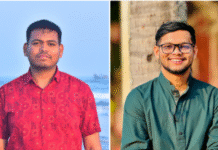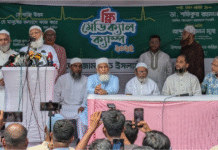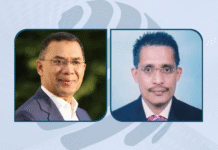Hefazat now plans to field candidates in over 50 constituencies, although some of the names under consideration by the group are accused of crimes and are facing several cases
Over 50 central leaders of Hefazat-e-Islam Bangladesh are planning to take part in the next national election under the banner of various registered Islamist political parties.
Although the Qawmi madrasa-based fundamentalist Islamist group claims to be a non-political movement, many of its members have already taken part in several local government elections in recent times, winning a few.
Following these victories, Islamist politicians who are affiliated with the group are now seeing the organisation as a potential vote bank.
Despite its reiterations about not participating in elections, Hefazat central leadership has been silently consenting to these political aspirations. Sources within the organisation say the leadership sees this as an opportunity to materialise their 13-point agenda.
Hefazat was formed in 2010 and came to prominence by mobilising opposition to the Shahbagh Movement in early 2013. It was then that they issued their now infamous 13-point charter, which included demands for a ban on the free mixing of men and women, and the death penalty for atheists.
Hefazat Ameer Shah Ahmed Shafi has said many times that his group is not a political party and they will not take part in any election.
But over the last few years, several Hefazat leaders have won public offices through local government elections, with tacit support from the group’s central command.
Nasir Uddin Munir, general secretary of Hefazat’s Hathazari municipality unit, was elected vice-chairman of Hathazari Upazila Parishad in 2014. The Hathazari madrasa is the headquarters of the group.
A Hefazat leader, seeking anonymity, said the organisation sees this as a sign that they are popular among the public.
Some of the political parties where Hefazat leaders are vying for candidacies are: Nezam-e-Islami Party, Jamiat Ulema-e-Islam, Khelafat Andolan, Khelafat Mojlish (Ishak), Khelafat Mojlish (Habibur Rahman), Khelafat Islami and two factions of Islami Oikya Jote (IOJ).
Sources said Hefazat now plans to field candidates in over 50 constituencies, although some of the names under consideration by the group are accused of crimes and are facing several cases.

Hefazat was formed in 2010 and came to prominence by mobilising opposition to the Shahbagh Movement in early 2013 Syed Zakir Hossain
A long-term plan
A central leader said the names of those who will take part in the national election will be finalised by Hefazat chief Shafi and other leaders who are in communication with the government, BNP and other big political parties.
Hefazat leaders will take part in the election under the respective party’s banner, but are also expected to flaunt their Hefazat credentials.
The group’s central leaders have been meeting potential candidates. The organisation is also trying to assess public opinion and will form a committee for the next election.
The source said only those politicians who accept the 13-point charter will be backed by Hefazat.
The group is aiming to get at least 50 seats in the parliament in the next general elections. A Hefazat central leader requesting anonymity told the Dhaka Tribune that the real aim of this campaign was to take the 13-point demand to parliament.
Many of the demands require passing laws.
“If we have our people in parliament, they can push for the 13-point charter,” the leader said.
The Hefazat source said the group’s central command is trying to pick those men who will be committed to work for Hefazat in the future.
Asked about Hefazat’s participation in the election, IOJ Secretary General and Hefazat Central Joint Secretary General Mufti Faizullah told the Dhaka Tribune that he would not be a candidate of Hefazat, but a candidate of political party IOJ.
“We are not trying to hide our identity as Hefazat leaders, but we will take part in the election from our political platform,” said Mufti, who is expected to stand in Chittagong 6 (Rangunia).
Shahriar Kabir, executive president of Ekattorer Ghatak Dalal Nirmul Committee, told the Dhaka Tribune that if Hefazat leaders came to parliament, it would be a “criminal” parliament.
“We do not want this situation and we are concerned about this issue. We hope the government will consider this matter,” he said.
IOJ, under which most of the Hefazat leaders are expected to vie the elections, may negotiate with the Awami League before the polls, sources said. The party left the BNP-led Alliance last year. IOJ sources said its leaders were lobbying the government for around 10 constituencies.
BNP standing committee member Gayeshwar Chandra Roy said it was unlikely that Hefazat leaders would want to side with BNP.
“They have stood in elections before. If they do this time, they will not want to take the BNP ticket. They will want the Awami League ticket – and Awami League should give it to them, too,” he said.
Awami League Joint General Secretary Mahbubul Alam Hanif refused to comment in this regard when the Dhaka Tribune contacted him by phone.
Hefazat’s 13-point demand
1 Reinstatement of ‘Absolute trust and faith in Allah’ in the constitution of Bangladesh and abolishment of all laws which are in conflict with the values of the Quran and Sunnah
2 Enactment of law in parliament with death penalty as the highest form of punishment to prevent defamation of Allah, Prophet Muhammad (SM) and Islam, and prevent spreading hate against Muslims
3 Immediate end to the negative propaganda by all atheist bloggers in a leading role in the so-called Shahbagh Movement who have defamed Allah, Prophet Mohammad (SM) and Islam, and their exemplary punishment
4 End to all alien cultural practices like immodesty, lewdness, misconduct, culture of free mixing of men and women, candle lighting in the name of personal freedom and free speech
5 Abolishment of the anti-Islamic inheritance law and the ungodly education policy. Making Islamic education compulsory in all levels from primary to higher secondary
6 Declaration of Ahmadis as non-Muslims by the government and put a stop to their negative and conspiratorial activities
7 End erecting statues at road intersections and educational institutions to save Dhaka, the city of mosques, from becoming the city of statues
8 End all harassment and obstruction at Baitul Mokarram and all mosques in Bangladesh preventing devotees from offering prayer. Also stop creating obstruction for people to attend religious sermons and other religious gatherings
9 Stop the spread of Islamophobia among the youth through depiction of negative characters on TV plays and movies in religious attire and painting negative stereotypes of the beard, cap and Islamic practices on various media
10 Stop anti-Islamic activities in Chittagong propagated by several NGOs and Christian missionaries under guise of religious conversion
11 End the massacre, indiscriminate shooting and attacks on Muslim scholars, madrasa students and the general public
12 End all threats against Islamic scholars, madrasa students, imams and clerics of mosques throughout the country
13 Immediate and unconditional release of all detained Islamic scholars, madrasa students and members of the general public and withdrawal of all false cases filed against them. Compensation to families of all injured and deceased and exemplary punishment to all those responsible
Possible prominent Hefazat candidates
 Chittagong 15 (Banshkhali):
Chittagong 15 (Banshkhali):
Mufti Isharul Islam
The leader of the Hefazat central committee and the executive president of Nezam-e-Islam party. He was the secretary general of IOJ, but the then-IOJ chief Mufti Fazlul Haque Amini dismissed him after allegations of terrorism.
 Chittagong 4 (Hathazari):
Chittagong 4 (Hathazari):
Mohiuddin Ruhi
IOJ joint secretary general and president of Chittagong IOJ unit. He is a joint secretary general of Hefazat and a powerful leader, but is seen as controversial inside the group.
 Chittagong 6 (Rangunia):
Chittagong 6 (Rangunia):
Mufti Faizullah
IOJ secretary general and also Hefazat central committee’s joint secretary general. He is an influential figure in the party and is renowned for his oratory.
 Narsingdi 1:
Narsingdi 1:
Maulana Abdul Latif Nezami
IOJ president and Hefazat central committee adviser. He is also known for his pro-BNP stand within his party. He was one of the central leaders who led the Hefazat movement in 2013.
 Jessore 5:
Jessore 5:
Mufti Mohammad Waqas
Jamiat Ulema-e Islam executive president, nayeb-e-ameer of Hefazat. He has had several encounters with law enforcement agencies, and has been in prison several times.
 Gazipur 1:
Gazipur 1:
Maulana Fazlur Rahman
IOJ joint secretary, secretary general of Hefazat’s Gazipur unit. He was at the core of Hefazat’s movement in Gazipur in 2013 and threatened to oust the government.
 Brahmanbariya 2:
Brahmanbariya 2:
Abul Hasnat Amini
Son of former IOJ chief Mufti Fazlul Haque Amini, IOJ vice-chairman, Dhaka city Hefazat secretary general. His madrasa in Lalbagh is the headquarters of Hefazat’s operations in Dhaka.
 Comilla 1:
Comilla 1:
Mufti Altaf Hossain
Office secretary of IOJ, Hefazat assistant secretary general. He is known to be loyal to the government and conducts all negotiations between the government and Hefazat and IOJ.
 Brahmanbaria 5:
Brahmanbaria 5:
Maulana Mehedi Hassan
IOJ central leader, Hefazat Nabinagar unit president. The 36-year-old has been with IOJ since his student days, and is an influential and wealthy businessman in Nabinagar.
 Munshiganj 1:
Munshiganj 1:
Maulana Abdul Hamid
Hefazat central nayeb-e-ameer and IOJ vice-chairman. He is also known as “Madhupur Pir” and enjoys strong influence in his locality. He also had a vital role during the Hefazat movement in 2013.









